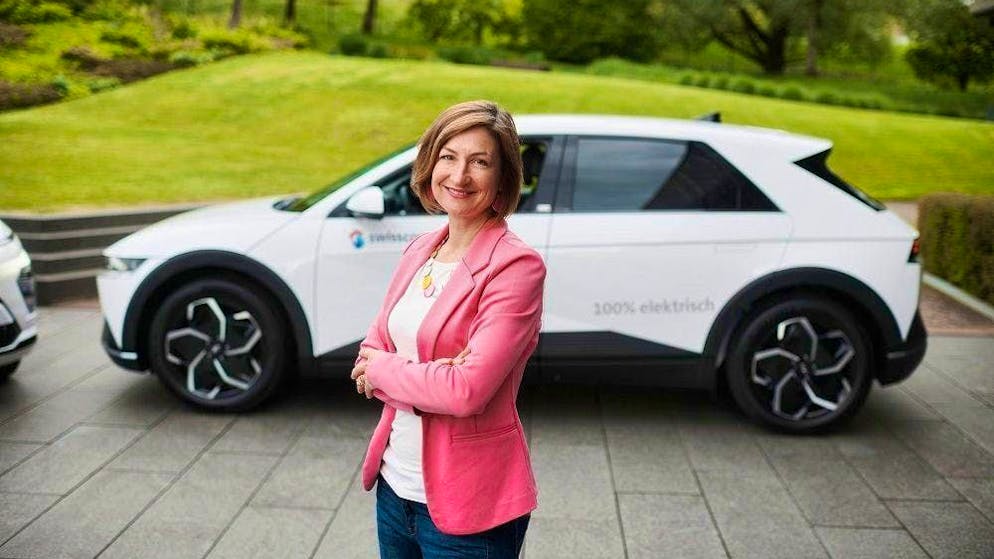Electric mobility Why the e-car is suitable for your road trip in Switzerland
Mario Stübi
17.7.2024

If you plan your vacation with an electric car, you can take an important step towards climate protection. Electromobility has many advantages, both for leisure and for companies.
No time? blue News summarizes for you
- E-cars are popular and their advantages make them a practical vacation companion.
- With the right electricity mix, electric cars have a better carbon footprint than combustion engines.
- Swisscom is switching to e-mobility and moving closer to its goal of "net zero by 2035".
Whether as a rental car on vacation or as an everyday vehicle: anyone who opts for e-mobility is in the fast lane. Electric cars are not only quieter and cheaper, but above all more climate-friendly than combustion engines.
«Studies show that electric cars produce 50 to 70 percent less CO₂ emissions than conventional combustion engines over their entire usage cycle, from production to disposal.»
Saskia Günther
Head of Sustainability at Swisscom
E-mobility therefore makes an important contribution to climate protection.
Electric cars: efficient and lower emissions
Electric motors use the energy supplied more efficiently than combustion engines. They convert most of the electrical energy into motion, while combustion engines lose a considerable amount of energy in the form of heat.

E-cars can be powered by renewable energy from wind, solar or hydropower. This reduces dependence on fossil fuels and improves the carbon footprint.
The charging infrastructure for electric cars has been expanding for years and charging times have become shorter, making them suitable for longer road trips.
Swisscom is also switching to e-cars
Not only private individuals, but also companies can make an important contribution to reducing CO₂ emissions by switching to e-mobility.
Swisscom has one of the largest company fleets in Switzerland and is switching to electric vehicles by 2030.
By the beginning of 2025, Swisscom will gradually add over 1,200 new electric cars to its fleet and will thus operate all passenger vehicles with electric drives.
"We want to achieve net-zero greenhouse gas emissions across the entire value chain by 2035," explains Saskia Günther, "and thus make a significant contribution to climate protection in Switzerland."
A major undertaking - but what does net zero actually mean?
Net zero: further reducing emissions
The term net zero has become increasingly important in recent years. For companies that have committed to this sustainability goal, net zero according to SBTi means that they must reduce their greenhouse gas emissions.
At the same time, they must offset the emissions they have produced through reduction measures. One step towards this goal is the switch to renewable energies or e-mobility. Swisscom has already reduced over 80 percent of its direct emissions since 1990.
The company has set itself the goal of reducing CO₂ emissions by a further ten percent by 2025, halving direct CO₂ emissions from its vehicle fleet and eliminating them completely by 2030. These interim targets are important milestones on the road to net zero by 2035.
Tips for car drivers
You too can make an important contribution to environmental protection by switching to e-mobility. Find out about the costs, charging options and range of the vehicle before you buy. The range varies depending on the model, battery capacity and driving conditions.
Longer-term use of e-vehicles is cheaper to buy than combustion engines. Taxes for e-cars are lower depending on the canton, as are maintenance costs.
E-car: what you should know
Long distances
- Modern e-cars have a range of 200 to 500 kilometers per charge, some even over 600 kilometers.
Charging station nearby
- Switzerland has a dense network of public charging stations in most cantons.
- Find out before your trip where you can charge your car en route and adjust your route accordingly.
Cheaper in the long term
- Electric cars tend to be more expensive to buy than cars with combustion engines.
- The costs for maintenance and operation are lower, making the purchase worthwhile over a longer period of time. There are now reasonably priced second-hand cars on the market.
This article was produced in cooperation with Swisscom
Swisscom is committed to ecological, social and economic sustainability: climate protection, a sustainable lifestyle and responsible use of new media. Swisscom has already received several awards as a sustainable company.


